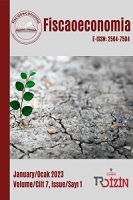Orijinal, Radikal ve Yönetimsel: Thorstein Veblen ve Amerikan Kurumsalcılığının Toplumsal Sınıf Kökenleri
Original, Radical, and Managerial: Thorstein Veblen and Social Class Origins of American Institutionalism
Author(s): Mehmet Gürsan ŞENALPSubject(s): Business Economy / Management, Economic history, Social Theory, Economic development, Socio-Economic Research
Published by: Ahmet Arif Eren
Keywords: American Institutionalism; Thorstein Veblen; German Historical School; American School; Managerialism;
Summary/Abstract: This study focuses on the last quarter of the 1800s, known as the Gilded Age in the U.S., and the first half of the 20th century, namely the Progressive Era and New Deal years. In doing so, the paper first nails down the relations among some leading figures of the American institutionalists with the German Historical School and the American School of Political Economy (or American School) during the Gilded Age. It has been widely accepted that the former group was heavily influenced by the latter schools. As is known, institutionalism was able to challenge the hegemony of neoclassical economics throughout the Gilded Age and the following Progressive Era, gaining important positions in the economics departments of American universities. Thus, the first two sections of this study focus on the so-called 'American', 'original' and 'radical' aspects of institutionalism. The main concern here is to understand how Institutional/Evolutionary Economics could, chiefly represented by Veblen’s biting satirical writings and radical critique of American capitalism that mostly mocked the lavish lifestyles of the nouveau riche of the day, be seen as powerful as neoclassical theory, and constituted a kind of 'orthodoxy' position in a country like the U.S. I focus on three distinct moments in which American Institutionalism was formed and became influential: (1) the influence of the German Historical School through Germany-trained ‘new generation’ of economists, (2) the contributions of the American School with their protectionist/nationalist doctrines, which was long forgotten by the mid-20th century. My discussion also aims to address (3) the social class origins and characteristics of institutionalism by trying to identify the key social class interests that it served or was appealed to. I argue that the American institutionalists were the 'organic intellectuals,' representing the progressive elements of this newly rising ‘managerial class’ in the New Deal. It was this organic relationship that was behind the success of institutionalism in the U.S.
Journal: Fiscaoeconomia
- Issue Year: 7/2023
- Issue No: 1
- Page Range: 86-114
- Page Count: 29
- Language: Turkish

